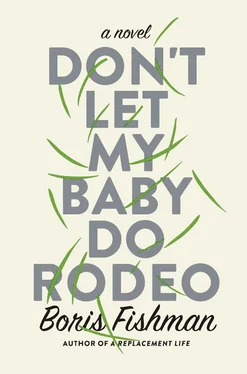“Orientation?” Alex said.
The orientation, a statewide colloquy in an ocean-side town, was attended by nine couples and two solos, one female and one male, setting off in Alex’s mind uneasy speculation about whether the solitary man’s wife was merely ill, or here was a man taking on parenthood all by himself. Of the other eight couples, three were gay and two religious, the latter signified by pins that said “Building God’s Army.” The Rubins’ eyes clung to the remaining heterosexual parents like floaters in a cold ocean.
Alex had never touched a gay man before, but now he was holding one’s hand as the twenty participants formed a grieving circle to commemorate their failed fertility. Why were the gays grieving? They hadn’t been failed by fertility, they had been failed by their dicks. He and Maya had been failed by fertility, and as the assembled strode and chanted, Alex absented himself by trying to guess which half of the other two normal couples (for that is the way Alex thought of them) was the sterile one. Was it the pale-face in glasses or his zebra-faced wife? Was it the ham-shouldered redhead with the pageboy, or her equally cavernous beau, wheezing like an asthmatic as they pounded the floor? Cupid loves every kind.
After lunch, which Alex and Maya had passed eyeing with envy the camaraderie starting between the other castaways, the group received a PowerPoint presentation on the various scams they could expect to encounter as parents-in-waiting. Financial Scams, one screen said. What other kind is there? Alex wondered. Emotional Scams, the next screen said. “Women will put up profiles claiming to look for adoption,” the lecturer said. “They’ll interview you, they’ll spend hours with you on the phone. And in the end, there’s no child. They’re just lonely. Meanwhile, you’ve been riding the roller coaster.”
The lecturer moved on, but Maya felt that a crucial piece of information was being left out, though she was too shy to raise her hand: How could a person protect himself from this kind of scam? Should she and her husband demand photos of a sloped belly as a precondition of talks? A signed certificate from the gynecologist? A meeting? Then she disobediently realized that she would not mind talking to this woman, the emotional scammer. She would prefer to know, of course, that there was no child, but this lonely, desperate charlatan struck her as someone with whom she could have a long talk, indeed.
That night, the Rubins were given homework: the profile that would hang on the IAS wall. Like the other applicants, they got a packet of samples and an instant camera, and were instructed to capture, between then and the next morning, three images that the rest of the group, playacting birth mothers and fathers, would cull for the one that made them say: I want to give my child to these people.
Alex and Maya had not filled out an application since writing colleges fifteen years before, and that was colleges; they were applying for a human being this time. How could one begin to answer the question of why one deserved to become the parent of a child carried and birthed by another? It was like being asked who one was, and what one planned to do about it. Of course they were loving, and patient, and generous — why would they ask to adopt otherwise — but so was everyone else filling out these forms. One had to be oneself, but what if one’s self was generic? In the seaside motel room rented with their orientation fees by the agency, Maya wondered what the other participants were writing. Alex didn’t think they were writing — they were out on the town with each other. Bonding.
He was at the small table by the window, Maya curled up on the bed, which smelled of industrial laundry detergent. Daylight began to merge with dark outside. Should they emphasize their hard work as immigrants? Downplay their religion? Try to be funny? Should they say they read books, or would that be looked upon with disfavor by mothers struggling with reduced circumstances? But they would want to donate their children to book-reading parents, wouldn’t they? However, the Rubins didn’t actually read books. With no forewarning, the assignment had brought on an existential self-examination they hadn’t requested.
Alex proposed that they wander outside for some fresh air; it was the farthest he and Maya had gone together in a while. Maya felt soldered to the bedspread, its corners crowned with tasseled pads that looked like epaulettes. But seeing Alex awaiting her authorization, she swung forward, the bag of stones in her belly sliding into her feet. She watched herself throw water on her face, recinch her ponytail, consider and then decide against her bag. She felt like an apparition. How would that read on the adoption form? “Prospective mother occasionally feels a stonelike weight on the soul.”
In the dying summer light, the humidity of the day mostly gone, jowled parents wandered in a lobster-skinned daze as their children set off sparklers and shouted. Next to them, Maya and Alex were overclothed, pale, monastic, disturbed. Weaving between the natives, they crossed the boardwalk to the beach, by now empty. Maya slipped off her shoes: the sand was grainy and cool. The ocean pounded rocks with a throttled boom, then wiped out on the shore with a hiss. Maya’s blackness lifted slightly. She marveled morosely: the gray water was indifferent to her heartbreak, but was able to lift it. Alex was not, but couldn’t. To her surprise, she didn’t feel as frightened of the ocean’s loud darkness as she expected.
She imagined a dolphin sailing out of the ocean and becoming their son. She had not thought of the child’s gender in the two months since she and Alex had first driven to IAS. It was such an obvious thing to wonder about, in fact one of the few that could set an Infertile Parent to reverie. Perhaps because she didn’t actually believe she would receive a child, son or daughter. With each step — the home inspection, the orientation, the brochure — the prospect of obtaining a child receded rather than neared, and she felt as if she were merely checking boxes so she could always say to herself that she had tried everything.
She pulled her blouse over her head, shivering quickly as a phantom wind whipped her chest. Alex called out her name questioningly; she ignored him. Her breasts, two miniature pears, felt oddly engorged, as if her imagining of motherhood had expanded them in preparation; for an unfamiliar moment, she experienced what a full-chested woman might feel like, her breasts straining at her bra. How many men had held them before Alex Rubin closed them in his grasp? Alex was a cupper, gentle and tentative; there had been pluckers, pullers, snappers, flickers, and mashers. One had emptied a full bottle of juice on her breasts before lapping it up with his tongue; some had emptied themselves. She remembered Anton, a metalhead, interrupting his vigil of sullenness to announce that they looked and tasted like marzipan. There were many. There could have been many more. Of them all, she had chosen Alex Rubin. Perhaps because he had started out tentative, apologetic, and shy; frankly, she was startled by these qualities. Had ceased to expect them from men. With her greater experience, she had given him the gift of his sexuality, and loved giving it. He bloomed in her hand, her mouth, her legs.
Her fingers met below her shoulder blades and flicked the latch of her bra, which brought forth another concerned question from Alex. The bra popped from her chest and slid down her arms until it plonked to the sand, a violet crab. Her khakis were next. To Alex’s relief, her underwear stayed on, though his eyes remained nervously on the boardwalk; the burghers walking it would not look kindly on a striptease in front of their children, and the adoption authorities would not look kindly on an arrest for public exposure. (“We would make successful adoptive parents because we have known both sides of the law. .”) Was his wife having a nervous breakdown? In frazzled moments, Alex’s instinct was to lay hands on his wife; her skin, cool and marmoreal, seemed to contain an unguent that interacted exclusively with the trouble he felt. But now she was the trouble, and so he stood, blinking, as she walked toward the water, her feet kicking up sand like a pair of hooves. His wife had nice legs that always asked for attention, even now. “I won’t be long,” she called. He leaned down and scooped up the bra, at least a slight gesture in the direction of order.
Читать дальше












